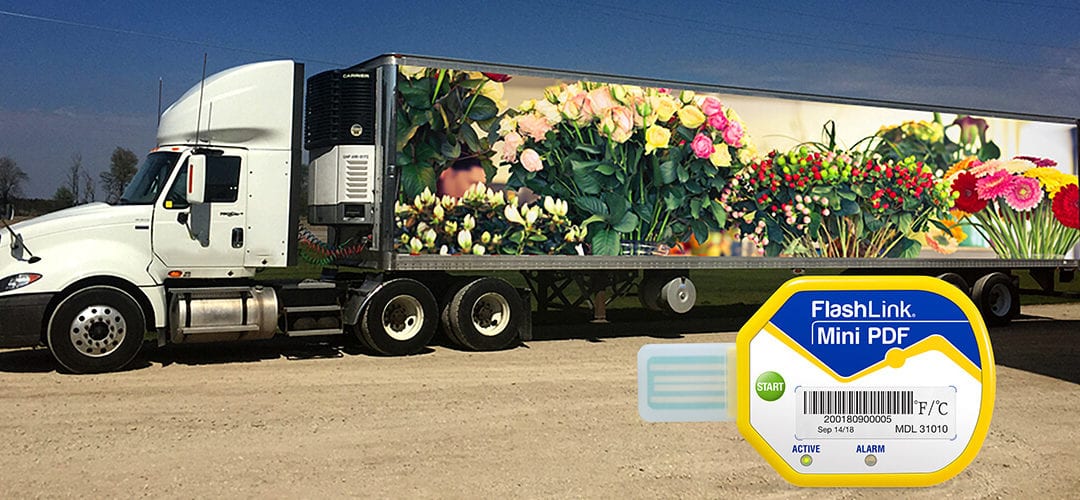Increasing regulations and cold-chain monitoring requirements have spurred the market for devices capable of logging and transmitting the temperature of perishable cargo shipments, often in real time. The devices, which were primarily designed for monitoring the cold chain of edible cargo – such as meats and produce – can provide useful information for businesses in the floral industry seeking to improve the quality and longevity of flowers shipped by air, ocean or land.
“Monitors designed for cargo may also offer benefits for floral cold chains.”
Since April 2016, the U.S. Food and Drug Administration (FDA) has begun implementing its Food Safety Modernization Act (FSMA), which added temperature monitoring and record-keeping requirements throughout every step of the shipment process. This was designed to ensure perishable foods, such as meat and other animal products, are maintained at a proper temperature and remain safe for human consumption.
“There’s a standard requirement to monitor food, pharmaceuticals and expensive high-end products,” said Fred Wu, president and CEO of DeltaTrak, a Pleasanton, Calif.-based company that offers three lines of monitors for temperature, location and humidity. In addition to food safety regulations, many insurance companies require data loggers for high-value cargo.
“Bulk trailerloads of floral are commonly monitored, but not always,” said Roger Niebolt, sales manager at Cargo Data, a monitoring company located in Ventura, Calif. Because there are no legal requirements to monitor the temperature of flowers, the floral industry has been slower to catch onto the trend, despite the advantages offered by monitoring devices.
“Temperature and time are data points that can be used to help predict remaining shelf life,” said Kelci Richardson, marketing coordinator, cargo solutions, at Emerson Commercial & Residential Solutions, based in Boise, Idaho. “We can work with our customers to understand these data points and have worked with them in the past to employ shelf-life algorithms.” However, Richardson warned, it’s not an exact science. “It’s necessary to understand there are many considerations – not just temperature – that go into monitoring life span and shelflife of perishable products.”
Still, floral companies can use the data collected by the monitors to support insurance claims, for example, if the product on a specific shipment arrived damaged or had a shorter shelflife than expected.
“We don’t control everything within the chain,” said Marcus Gahn, sales director at ColdWhere. “But what we can do is tell you exactly where the truck is and tell you exactly what the temperature was when it failed.” The Bloomington, Minn.-based company’s monitors not only record and transmit information on the temperature, humidity and location of a shipment, they also record motion – such as heavy brake activity that might affect delicate shipments – and light conditions in transit. If any of these conditions change to the extent that the quality of the shipment might be threatened, Gahn explained, trucks can be pulled over to save parts of the shipment or fix technical issues disrupting the cold chain.
The monitors can also be used to increase the efficiency of refrigeration systems by preventing over- and undercooling, DeltaTrak’s Wu noted.
In the case of flowers, the data collected may help wholesalers direct products to the most appropriate sales point, Gahn said. “The flowers may have a different shelflife, so they may need to be put in a different store environment,” he explained. “If it’s going to a chain of convenience stores or grocery stores, it needs to go to the ones that have higher [sales] volume.”
The industry has seen an influx of companies providing temperature-monitoring devices, but there’s still plenty of room for growth, especially to encourage broader adoption by the fl oral industry. For example, Niebolt said, real-time transmission is not allowed on airplanes – which transport a majority of international fl oral shipments – because the devices use cellphone technology to transmit data, which can cause interference with aircraft systems.
None of the devices offered by ColdWhere, DeltaTrak, Emerson or Cargo Data have any capabilities to fix temperature issues once they’ve been detected. Gahn said his company’s device already has some of the basic capabilities required to execute commands like increasing or decreasing cooling activity; however, partnerships with leading refrigeration companies would be necessary to use the device for adjusting the temperature within a cargo unit or help with diagnostics in case of a technical mishap.
“We’re just not quite there yet,” Gahn admitted. “Perhaps, down the line, we can integrate into that system, tell you what’s going on, but our device doesn’t have a screwdriver built into it, so there’s only so far we can get.”
Still, representatives of all four companies said the market response to their product has been largely positive. “We’ve saved people time and money, and we’ve had great receptions at trade shows,” Gahn said.
Richardson agrees, saying her company’s clients have seen the value provided by the small devices attached to their boxes and crates. “As their cold-chain partner, we have become an important part of their quality-assurance (QA) programs.”


Alena is a print journalist living in Palm Springs, Calif. She has a personal passion for flowers sparked by early-morning visits to the Los Angeles Flower Market during her time as an exchange student at the University of California Los Angeles. Originally from Germany, she graduated with a master’s degree from the Columbia University School of Journalism in New York City in 2017. Alena has a particular interest in working with data and pursuing stories across borders.







